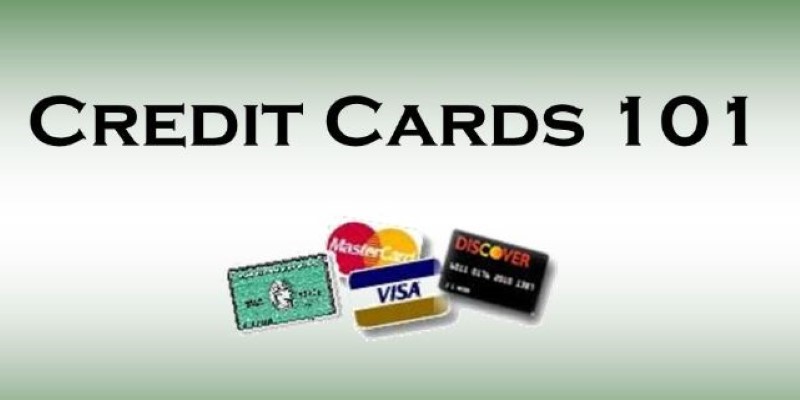Advertisement
Credit cards are a staple in todays financial world, often seen as tools for convenience, rewards, and easy purchases. However, understanding how they work can sometimes be confusing. Whether youre aiming to build credit, earn rewards, or benefit from secure payment options, its essential to know the basics.

This guide will explain credit cards, how they work, and what to keep in mind when you decide to get one. By setting a solid foundation for smart credit management, you will be better equipped to use credit cards responsibly and avoid common financial pitfalls.
At its most basic, a credit card lets you borrow money up to a pre-set limit to make purchases. A credit card is different from a debit card in that money is not automatically pulled directly from your checking account but rather acts as a borrowing tool from the issuing bank, which you intend to pay off the balance of overtime. Each month, you are sent a statement stating the amount that you owe. You have the right to pay any amount between that minimum and the full balance. In the event you do not pay the full balance, interest will be added to that remaining balance.

The credit limit is the total amount you can draw from your credit card. The available balance is the remaining amount of money in your account after deducting all of your purchases. For instance, if you have a $2,000 limit and spend $500, you still have $1,500 left. However, over-drafting your account attracts fees, and you also risk affecting your credit score.
The APR is the rate at which interest is charged on unpaid balances and varies by factors such as credit score and card type. For instance, a 20% APR means 20% annual interest on carried balances. Many cards offer introductory 0% APR for early purchases, which helps with big expenses.
Credit cards come in many different forms, and each is designed for a specific purpose. The one you choose will depend on your goals, spending habits, and creditworthiness.
Rewards cards are popular for those who want perks for their spending. These cards offer points, cash back, or airline miles based on your purchases. Typically, cash-back cards offer a percentage return on each dollar spent, while point-based cards let you accumulate points to redeem for travel, merchandise, or statement credits. Rewards cards can be beneficial, but only if you pay off your balance monthly to avoid interest charges that could outweigh the perks.
If youre carrying debt on multiple credit cards, a balance transfer card can help consolidate what you owe and reduce interest costs. Many balance transfer cards offer a 0% APR introductory period, allowing you to pay down the principal without accruing additional interest. However, keep an eye out for balance transfer fees, which can range from 3% to 5% of the transferred amount. This option is helpful for those committed to reducing debt but requires careful planning to maximize savings.
Secured credit cards provide an entry point to credit for people with limited or damaged credit histories. Secured cards require a cash deposit, which acts as collateral and typically equals the card's limit. By using the card responsibly, paying on time, and keeping the balance low, you can build or improve your credit score over time. Eventually, issuers may upgrade responsible users to an unsecured card, returning the deposit.
Credit cards can be valuable tools, but they require careful handling to avoid potential financial strain. Here are some practical tips for managing your credit cards wisely.
Keep Track of Your Spending: Setting a budget and monitoring your transactions helps avoid overspending. Use mobile apps or online platforms offered by issuers to track real-time expenses, making it easier to manage your credit card use responsibly.
Pay Your Balance in Full When Possible: Paying off your full balance each month avoids interest and strengthens your payment history, boosting your credit score. If thats not possible, paying more than the minimum helps reduce debt faster.

Mind Your Credit Utilization Ratio: Keeping your credit utilization under 30% promotes a healthy credit score. For instance, on a $5,000 limit, maintaining a balance below $1,500 supports good credit and shows financial responsibility.
Beware of Fees: Credit cards may include fees like foreign transactions and annual and late payment fees. Before applying, review fee details to avoid surprises. Frequent travelers should seek cards with no foreign transaction fees to save.
One major advantage of using credit cards responsibly is the potential to build and improve your credit score. Credit cards contribute to your credit history and credit score, a numerical reflection of your creditworthiness. Heres how credit cards impact your score:
Payment History: Consistently paying your credit card bill on time shows lenders youre reliable, positively impacting your score.
Credit Utilization: Maintaining a low credit utilization rate supports a good score.
Length of Credit History: The longer youve had a credit card in good standing, the more favorable it looks to lenders. Closing old accounts can negatively affect this component, so think carefully before closing credit cards, especially ones with a long history.
Credit cards can be powerful financial tools when used thoughtfully, providing flexibility, security, and even rewards. Understanding the basicsfrom interest rates and credit limits to the impact on your credit scoreempowers you to make informed choices. By staying within your credit limit, paying off balances, and choosing a card that fits your lifestyle, you can enjoy the benefits while steering clear of debt. With the knowledge from this guide, you're now equipped to take control of your credit card use and build a solid foundation for a healthy financial future.
Advertisement

By Madison Evans/Jan 20, 2025

By Sid Leonard/Feb 28, 2025

By Vicky Louisa/Mar 17, 2025

By Nancy Miller/Mar 18, 2025

By Sean William/Jan 11, 2025

By Alison Perry/Jan 20, 2025

By Mason Garvey/Dec 06, 2024

By Sean William/Dec 15, 2024

By Pamela Andrew/Mar 17, 2025

By Darnell Malan/Feb 28, 2025

By Gabrielle Bennett /Mar 01, 2025

By Martina Wlison/Mar 18, 2025